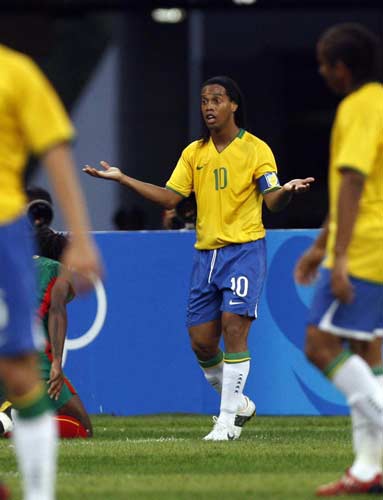Your support helps us to tell the story
From reproductive rights to climate change to Big Tech, The Independent is on the ground when the story is developing. Whether it's investigating the financials of Elon Musk's pro-Trump PAC or producing our latest documentary, 'The A Word', which shines a light on the American women fighting for reproductive rights, we know how important it is to parse out the facts from the messaging.
At such a critical moment in US history, we need reporters on the ground. Your donation allows us to keep sending journalists to speak to both sides of the story.
The Independent is trusted by Americans across the entire political spectrum. And unlike many other quality news outlets, we choose not to lock Americans out of our reporting and analysis with paywalls. We believe quality journalism should be available to everyone, paid for by those who can afford it.
Your support makes all the difference.Lionel Messi and Ronaldinho will go head-to-head in the semifinals of the Olympic football tournament on Tuesday in the latest chapter of a storied rivalry between Argentina and Brazil.
The two former FC Barcelona teammates will be chasing a place in the final and the chance to win a gold medal. Argentina is the defending champion, Brazil has never won the title.
The question is: outside of Argentina and Brazil, will anyone else really care?
The Olympic football competition has had image problems for decades and the reality of the Beijing Games is that, whoever wins the title, far more people will remember Michael Phelps' record eight gold medals in the swimming pool, Usain Bolt's world record in winning the 100 meters on the track and host China's incredible haul of gold.
Football, however, had the best start possible in terms of media coverage - a big controversy.
The clubs won a ruling only days ahead of kickoff that they could pull players such as Messi, Diego and Rafinho out of the competition. Then they let them play after all.
The competition unearthed a rising star in Ivory Coast forward Gervinho and produced a stunning quarterfinal turnaround by Belgium, which beat favored Italy 3-2 after being 1-0 down with only 10 men on the field.
Messi and Ronaldinho have played their parts, too.
Messi has scored two of Argentina's goals and set up two more as well as thrilling sellout crowds with his amazing dribbling skills. Even Diego Maradona showed up to cheer the team on as it defends the Olympic title.
Ronaldinho scored twice in Brazil's 5-0 rout of New Zealand and seems to be regaining his old sharpness.
Whoever wins Tuesday's showdown in Beijing will go to Saturday's final and face either 1996 champion Nigeria or Belgium, who play in Shanghai.
But there seems little doubt that, without these big-name players bolstering squads which are restricted basically to players 23 and under, the Olympic football competition would carry on almost with no one other than hardcore fans showing any interest.
The timing of the games doesn't help. Because the action is taking place in China, the matches are being played mid-morning or early afternoon in Europe and Africa, and while people in North and South America are still asleep or just waking up. The games are rarely screened live.
League football has also just resumed in England, Germany and France, so coverage of the Olympic competition has been reduced in those countries, none of whom had men's teams in Beijing anyway.
It's difficult to see how the organizers or Fifa can make the competition more compelling so that it gets the same interest as athletics, swimming or gymnastics.
Fifa is reluctant to allow the national teams to send their strongest players because it would rival the World Cup. It compromised by allowing teams to field three over-age players, and that's how the 28-year-old Ronaldinho got his chance to play.
Maybe football's only solution to make a big impact is for FIFA to allow the full national teams to play. To get around the problem of yet another qualifying competition, it could invite the six confederations to send their top teams in the world rankings.
If it did that, and made sure that the Olympics were part of its official international calendar so that clubs have to release their players, then Fifa might solve two problems.
But football would still have to get used to letting the other traditional Olympic sports have the spotlight.

Join our commenting forum
Join thought-provoking conversations, follow other Independent readers and see their replies
Comments